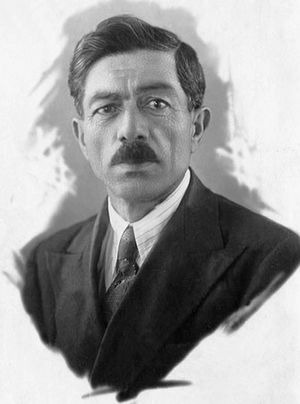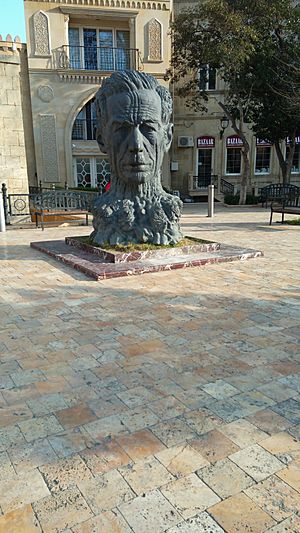Aliagha Vahid facts for kids
Quick facts for kids
Aligha Vahid
Əliağa Vahid |
|
|---|---|
 |
|
| Born | 17 February 1895 Masazyr, Baku, Azerbaijan |
| Died | 1 October 1965 (aged 70) Baku, Azerbaijan |
| Occupation | Poet, Ghazal Singer |
| Nationality | |
| Literary movement | Gazal |
| Notable works | Mollakhana |
Aliagha Mammadgulu oghlu Isgandarov (Azerbaijani: Əliağa Məmmədqulu oğlu İsgəndərov) was an important Azerbaijani poet. He was born on February 17, 1895, in Baku, and passed away on October 1, 1965, also in Baku. He was recognized as an Honoured Artist of the Azerbaijan Soviet Socialist Republic in 1943. Aliagha Vahid is famous for bringing back the old ghazal poetry style in Azerbaijan.
Contents
Life and Poetry
Aliagha Vahid was born in 1895. His father was a carpenter. From a young age, Aliagha helped his father and worked hard. He started his education in a religious school called a madrasa. However, he did not finish his studies there.
Joining a Literary Group
Instead, Aliagha joined a group of writers and poets called “Mejmeush-shuara.” Here, he met other popular poets from Baku. They helped him write his first poems. At first, he wrote poems that made fun of problems in society. He criticized old ways of thinking and unfairness. These early poems were collected in a book called The Result of Avidity.
Becoming a Ghazal Poet
Later, Aliagha Vahid was inspired by famous poets like Fuzûlî and Seyid Azim. He then started writing ghazals. Ghazals are a special type of poem, often about love or deep feelings. His ghazals became very popular with people. Because of this, he was given the nickname Ghazelkhan, which means "ghazal singer."
Working with Newspapers
Aliagha Vahid supported the new Soviet government in Azerbaijan. He wrote poems that encouraged people to support the new system. Some of these poems include To My Comrade Laborers and Soldiers and What Does the School Mean.
In 1924, Aliagha Vahid met a famous Russian poet named Sergei Yesenin. Yesenin was living in a village near Baku at the time. They became good friends.
After the Soviet government was set up, Aliagha Vahid worked with the “Kommunist” newspaper. He also wrote for a funny magazine called “Molla Nasraddin.” In his books like “Couplets” (1924) and “Mollakhana” (1938), he used humor to criticize those who were against the new system.
Poems During Wartime
During World War II (which was called the Great Patriotic War in the Soviet Union), Aliagha Vahid wrote poems that showed love for his homeland. These poems also expressed anger towards the enemy and hope for victory. These works include Battle Ghazels (1943) and Ghazels (1944).
Legacy in Poetry
Aliagha Vahid followed the style of Fuzuli, a very important poet from the past. Aliagha Vahid became a leading writer of ghazals in the Soviet era. He also translated ghazals by other famous poets like Nizami, Fuzuli, and Khaqani into the Azerbaijani language. He is also thought to be the creator of meykhana, which is a modern form of ghazal poetry.
Aliagha Vahid passed away on October 1, 1965, in Baku. He was buried in the Alley of Honor, a special place for important people.
Memory
Many places in Baku are named after Aliagha Vahid. These include a school, a park, a garden (which used to be called the Gubernatorial garden), a house of literature, and a street.
A large bronze statue of Vahid was made in 1990. It stands in a small garden in Baku's Old City. This statue was moved to its current spot in 2009.
In 1991, a film called Ghazelkhan was made. This movie was about Aliagha Vahid's life and his poetry. It was produced by the Azerbaijanfilm studio.
See Also
- Azerbaijani literature
- Ghazal


